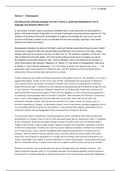S. V. H. Boyes
Section 1 - Shakespeare
1(a) Discuss the following passage from Act 5 Scene 3, exploring Shakespeare’s use of
language and dramatic effects [15]
In this extract, Richard’s guilty conscience manifests itself, in part personified by Buckingham’s
ghost, in Richard’s feverish imagination as a throng of witnesses all giving evidence against him. The
certainty of his eternal damnation reverberates throughout the passage via word choice and the
structure of Richard’s speech as he is confronted with his own mortality, resulting in the mental
disarray and chaos that ensues.
Shakespeare illustrates the extent of Richard’s guilt and internal insecurities through several implicit
references to death/the after-life, demonstrating that Richard’s subconscious mind does, indeed,
despair, although his conscious one may not allow him to. The anaphoric repetition of “the last” may
refer to Richard’s imminent death, with all his actions being his last once he awakes, as well as
Buckingham having been Richard’s “last” hope of salvation, had he not killed the two princes, to
which Buckingham had objected. Repetition of “dream on” may allude to Shakespeare’s later work
of Hamlet, in which Hamlet soliloquises, “for in this sleep of death what dreams may come…”. This
association alerts later audiences to Richard’s fate, with the repetition reinforcing Buckingham’s
demand that Richard be eternally damned for his crimes.
Further references are made to Richard’s damnation throughout lines 4-6 - the repetition of “d” has a
jagged biting effect, similar to that of the ‘jaws of Hell’, emphasising the viciousness of Richard’s
own mental torment and ghostly tormentors; however, this could be a subtle allusion to Richard
being “the bloody dog” in reference to the mythical hounds guarding Hell’s entrance through the use
of such plosives. The polyptoton (“despair; despairing”) more obviously rhetorically reinforces the
idea that Richard is beyond the grace of God, with the repetition of word choice being significant in
its meaning of being entirely devoid of hope of ‘salvation’, demonstrating that Richard’s conscience
does, in fact, acknowledge God and the after-life as important. Were this not the case, the
epistrophe “despair and die” used by previous ghosts in his dream would not employ such an
emotive imperative as ‘despair’ so decisively unless it was of importance, perhaps suggesting that in
his vulnerability Richard’s guilt turns his attention to the spiritual and religious ramifications of his
misdeeds, despite having disregarded these consequences throughout the play.
This argument seems compelling in that Buckingham’s ghost crystallises Richmond as being the
embodiment of Christian virtue in line 9 (“God and good angel fight on Richmond’s side”), in addition
to the comparison of Richard to Satan through the tale of Lucifer’s fall in line 10 (“Richard falls in
height of all his pride”). Both images employ religious imagery and the ghost is ultimately a figment
of Richard’s imagination, therefore he must have some religious inclination. Furthermore, Richard’s
cry of “Have mercy, Jesu!” almost immediately after awakening forces him to confront his own
mortality, with his reflexive reaction being to pray, ironically, before he stops himself. One could
argue that once kingship is achieved he no longer has an ambition and must be confronted by his
mortal vulnerability and inability to achieve salvation or receive God’s grace - having previously been
able to manipulate others, it seems ironic that he is unable to wield the same power over himself.
Richard’s emotional trauma perpetuates the rest of his fragmented and sporadic soliloquy - the
metric disruption between lines 15-18 pointedly exposes his emotional agitation and the profound
impact that his unstable attempts at self-assurance have upon his previously admirable intelligence.





